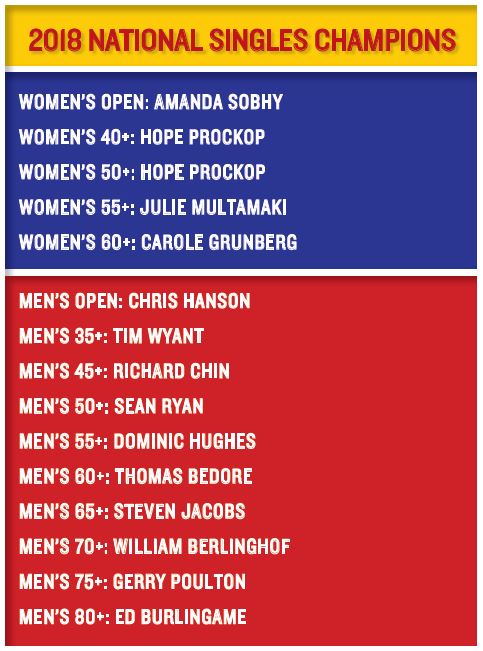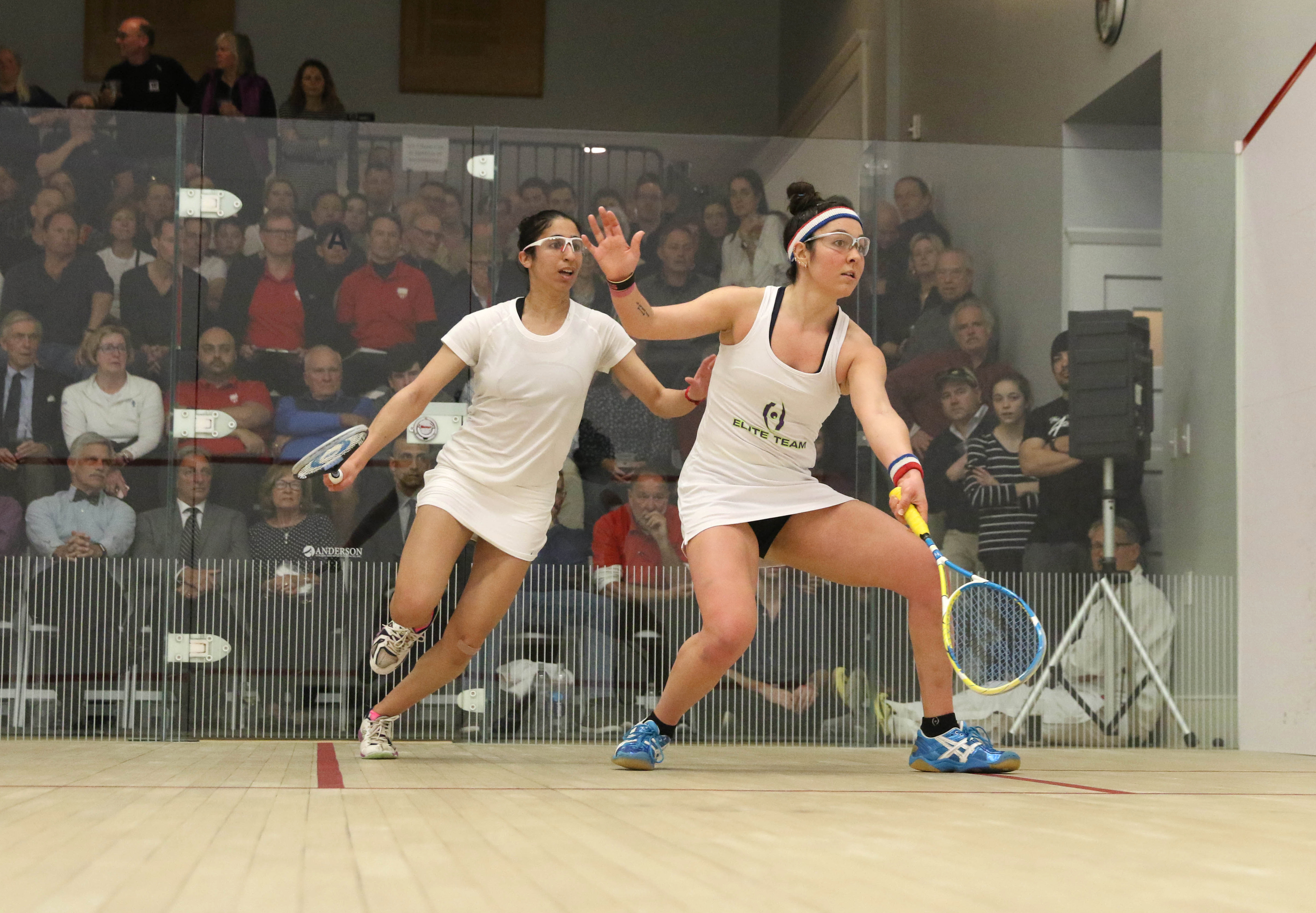Above: Amanda Sobhy (r) clinched the National Singles title in her first career match against two-time finalist Reeham Sedky.
by Chris McClintick
March 10 is a date that will always have some negative association for Amanda Sobhy. It was on March 10, 2017, that the then twenty-three-year-old ruptured her Achilles tendon in a PSA final against U.S. teammate Olivia Blatchford—a setback that kept her off the PSA Tour for the next ten months and sent her out of the 2017 National Singles. Sobhy admitted that the 2018 National Singles finals date of March 10 stuck out to her leading into the tournament. “When I saw the date of this event I really wanted to go on court and make a statement,” Sobhy said. “I wanted to prove the saying that you come back from an injury stronger.”
Ranked world No. 6 at the time of her injury, Sobhy returned to the PSA Tour ranked No. 28 at the Tournament of Champions in January where she reached the second round. A semifinal run at the Cleveland Classic and quarterfinal run at the Windy City Open propelled her back to world No. 18 by March, earning her the top seed in the U.S. Women’s Championship draw opposing two seed defending champion Olivia Blatchford in the draw.
The fifteen-player draw took a few unexpected turns. Sabrina Sobhy, a junior at Harvard and 2014 national champion, upset world top-fifty-ranked Haley Mendez to set up a semifinal match against her older sister. The Sobhy sisters put on a show for their fellow National Singles competitors on Friday night, grinding out a well-spirited, captivating five-gamer in which Amanda pulled off the comeback 6-11, 11-2, 10-12, 11-5, 11-8.
Fresh off winning her first College Individual national title the weekend before nationals, Reeham Sedky once again made waves through the draw. The UPenn junior and four seed avenged her 2017 National Singles final loss against Blatchford with a four-game upset to reach her second consecutive final. Sobhy stopped Sedky in her tracks in the final, clinching her fourth U.S. Women’s Championship title 11-6, 11-8, 11-4.
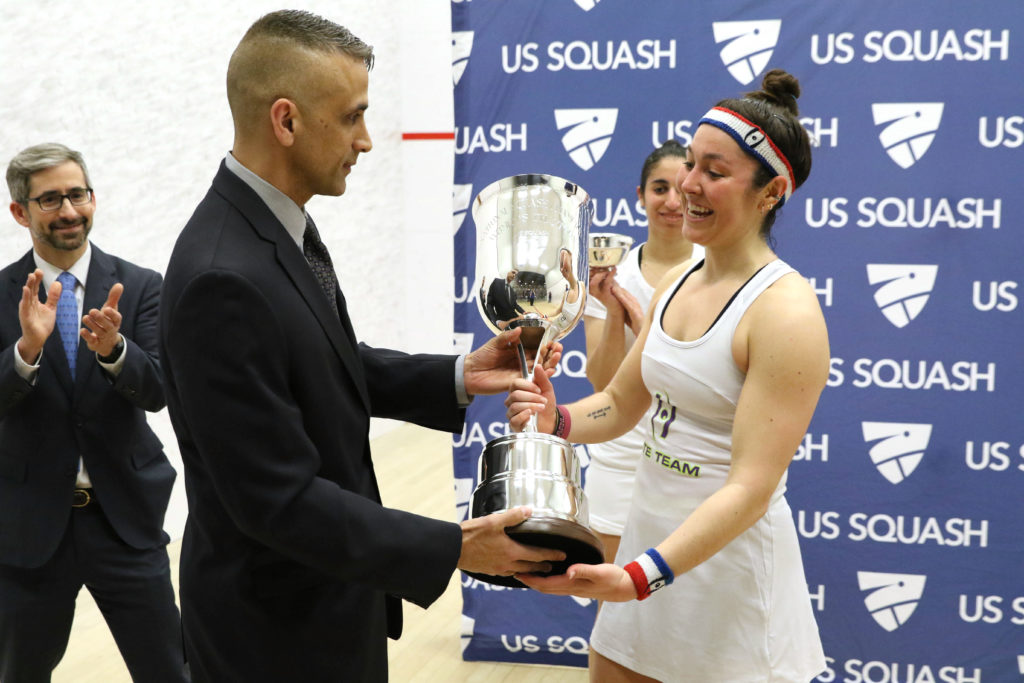
Sobhy celebrated her fourth title in eight years with some new hardware. Benefactor and National Singles 45+ competitor Sunil Desai handed off the newly-minted U.S. Women’s Championship trophy, inspired to create trophy size parity to match the S.L. Green U.S. Men’s Championship trophy.
“We’re really happy that Amanda is fully recovered and back in action,” Desai said. “Amanda, Reeham and all of the women’s championship competitors this weekend proved that they are just as much the athletes and competitors as the men are, and have been deserving of parity in pay and recognition that for too many years they did not receive.”
For Sobhy, the title marked an important milestone on her ascension back to the top of her game: “I want to say that I’m back and better than ever.”
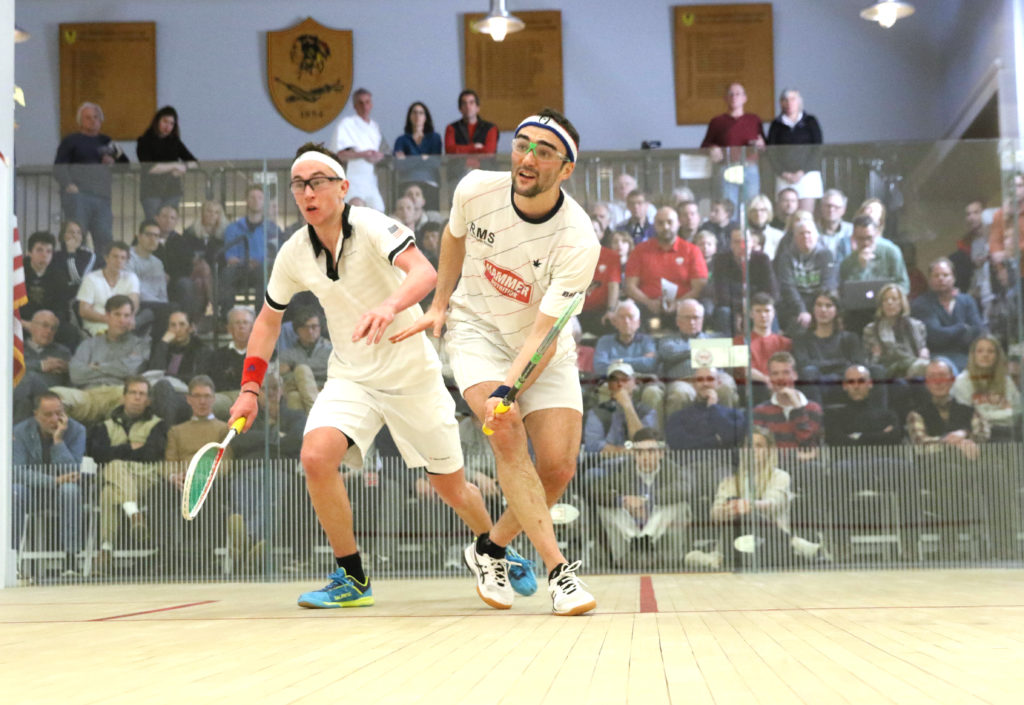
The 2018 S.L. Green U.S. Men’s Championship mirrored 2017 in both the depth of talent and results. Once again the competition drew a full qualifying slate of sixteen players including professional hopefuls, teaching professionals, recent college graduates, current college players and juniors—all battling it out for the chance to face off against the top American players in the sixteen-player main draw.
Alas, it was the same four faces that progressed to set up two semifinal rematches from 2017. The top three ranked Americans on the PSA Tour and top three seeds—Todd Harrity, Chris Gordon and Chris Hanson—all made quick work of their challengers without dropping a game on the way to the semis. UPenn freshman and two-time U.S. junior champion Andrew Douglas again upset the seedings with confident displays against his head coach and U.S. veteran Gilly Lane in the first round, and his first career victory over world No. 86 and four seed Faraz Khan in the quarters.
Douglas stole the headlines in the semis with his second consecutive semifinal upset over two-time champion Harrity—this time in four games unlike last year’s five—to reach his second straight final. Hanson similarly recorded his second career win against Gordon to set up a rematch of the 2017 final.
Hanson ultimately reasserted his position as the best in the U.S. in the final, claiming a second straight S.L. Green U.S. Men’s Championship title 11-8, 11-4, 8-11, 11-5. The twenty-seven-year-old became the sixth player to repeat national titles since the transition to softball, following the likes of Harrity, Julian Illingworth, Preston Quick, Damien Walker and Marty Clark.
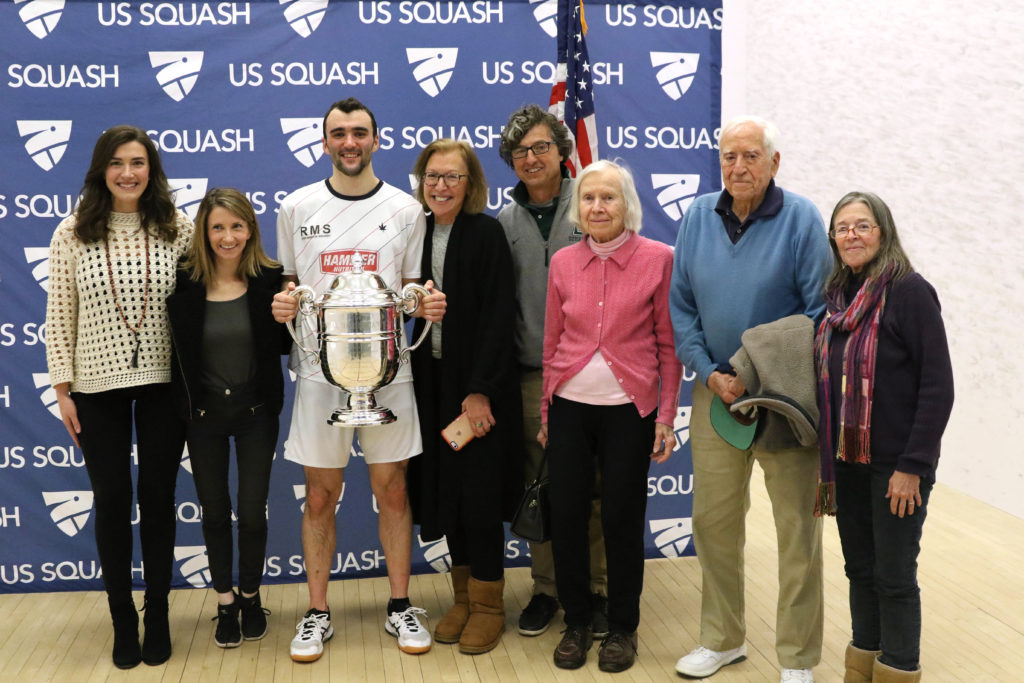
While the results were the same, Hanson’s tournament lead up this year vastly contrasted his surprise 2017 title run. Last year, Hanson nearly missed the tournament coming back from injury, with little personal expectation of winning the tournament. This year, the Dartmouth graduate entered the tournament with a career high world ranking of No. 63, and put in months of preparation with longtime coach Rod Martin.
“It’s surreal to come back and do this again,” Hanson said. “Last year was unbelievable, but this proves to myself that I can play at this level consistently now. Last year I went into the tournament not expecting to win, so I went in more relaxed. This year I put a lot more pressure on myself, but I also did a lot more work coming in, which is all thanks to my coach Rod Martin.”
As one of the first players to be supported by the US Squash Elite Athlete Program following his graduation in 2013, Hanson’s reign is a testament the results a year-round support system can provide America’s top squash players. With Douglas carrying the banner for the next generation of top American men, Hanson will have an even more difficult challenge defending his title next year—all for the benefit of Team USA.
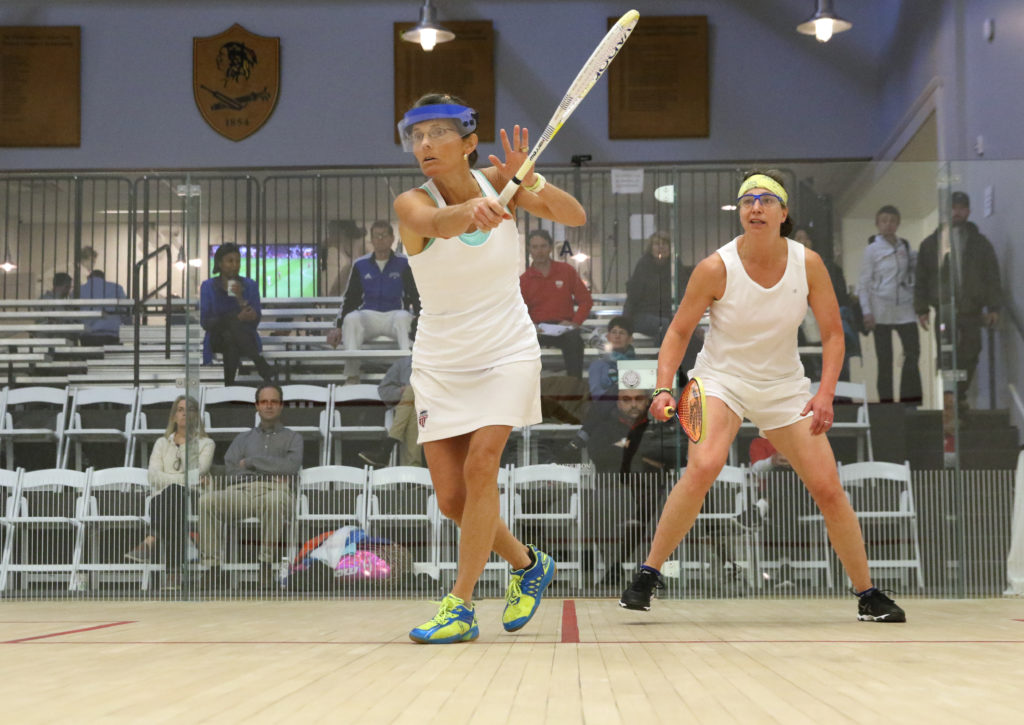
In the thirteen age-group divisions featuring 128 players, upsets stood side-by-side with expected victories.
The expected: Hope Prockop had the busiest weekend. She entered the open draw, marked numerous matches as an official referee and tore through two masters draws—the 40+ and 50+—without the loss of a game. Her National Singles double pushed her career record to twelve titles at the tournament. In the 60+ Thomas Bedore won his fourth National Singles title, topping Mike Riley in a hard-fought four-game final. Carole Grunberg defended her 60+ title, notching her sixth career National Singles win.
Three great rivalries resumed at PCC. Dominic Hughes faced off against perennial nemesis Richard Millman in the finals of the 55+. It was the sixth time they had faced each other in an age-group final. Last year Millman prevailed 11-9, 11-9, 9-11, 11-5. This year Hughes turned the tables with another match that had three games with the exact same score: 11-7, 11-7, 8-11, 11-7. In the 75+ it was again Jay Nelson v. Gerry Poulton, for the ninth time at the National Singles. In what was perhaps the most gripping final of the tournament, Poulton saved a couple of championship balls in the fourth game and escaped in the fifth: 8-11, 9-11, 11-5, 15-13, 11-8. In the men’s 80+, Ed Burlingame and Paul Segal met for the fourth time at the tournament. Burlingame tiptoed out with a victory: 9-11, 11-5, 12-14, 11-7, 11-4.
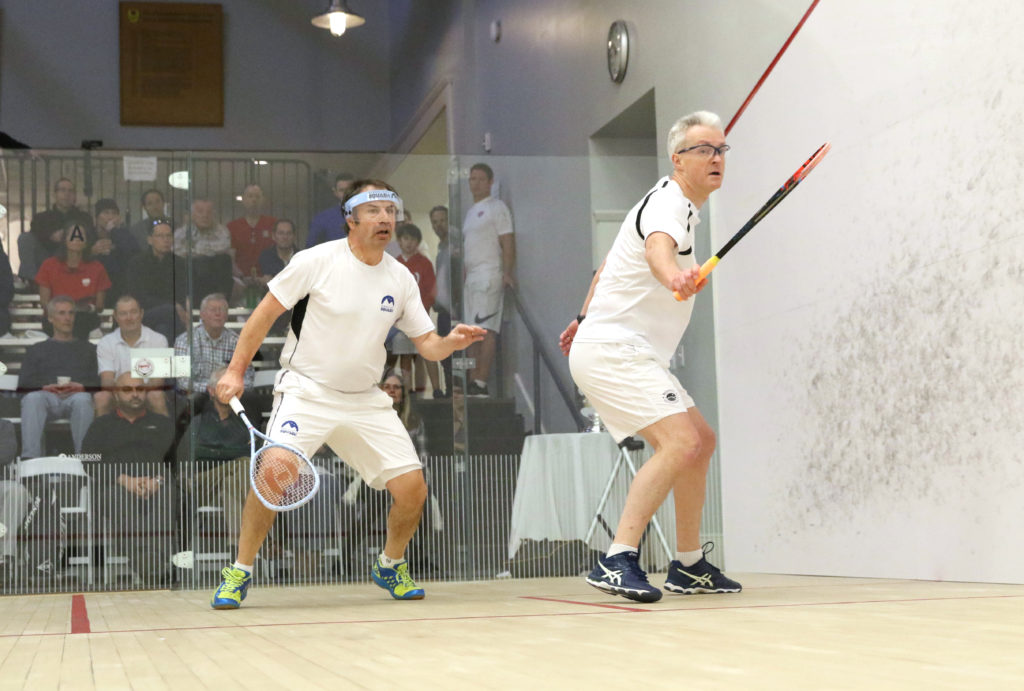
A few first-timers made an impact. Julie Multamaki, playing the 55+ in her first appearance at the National Singles, came back in the final from a 1-2 deficit to top defending champion Jill Campion. Another neophyte, Lee Scott, upended John Musto in a five-game semis and then pushed Richard Chin to four games in the 45+ final. (It was Chin’s third straight title in the division.) Tim Wyant romped to his first National Singles win in the 35+, twenty-eight years after he last earned a national title, in the 1990 BU12 division.
In the 50+ Sean Ryan didn’t dominate—he lost games in the quarters and semis—but he clinched his first National Singles title in the finals in three. In the 70+ William Berlinghoff earned his second National Singles title (the most exciting match in the division was probably two Ohioans in the first round, Maurice Bason and Tom Olsen, which Olsen won 11-6, 15-13, 9-11, 10-12, 11-3.) Steve Jacobs of British Columbia didn’t lose a game in four matches, including defeating three-time defending champion Don Sheer in the finals.
